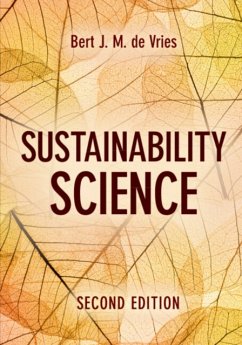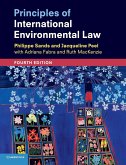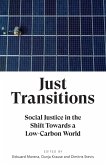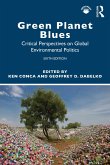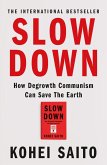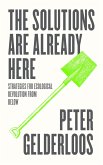Bert J. M. de Vries (The Netherlands Universiteit Utrecht)
Sustainability Science
Bert J. M. de Vries (The Netherlands Universiteit Utrecht)
Sustainability Science
- Broschiertes Buch
- Merkliste
- Auf die Merkliste
- Bewerten Bewerten
- Teilen
- Produkt teilen
- Produkterinnerung
- Produkterinnerung
Fully updated, this second edition provides a class-tested system analysis approach to sustainability for advanced undergraduate and graduate students. The latest scientific data and insights are integrated into a broad transdisciplinary framework. Readers explore sustainability issues through the lenses of cultural and methodological pluralism.
Andere Kunden interessierten sich auch für
![Renewable Energy Renewable Energy]() Nick Jelley (Emeritus Professor in the Department of Physics and aRenewable Energy8,99 €
Nick Jelley (Emeritus Professor in the Department of Physics and aRenewable Energy8,99 €![Food or War Food or War]() Julian CribbFood or War23,99 €
Julian CribbFood or War23,99 €![Principles of International Environmental Law Principles of International Environmental Law]() Sands, Philippe, QC (University College London)Principles of International Environmental Law52,99 €
Sands, Philippe, QC (University College London)Principles of International Environmental Law52,99 €![Just Transitions Just Transitions]() Edouard MorenaJust Transitions33,99 €
Edouard MorenaJust Transitions33,99 €![Green Planet Blues Green Planet Blues]() Green Planet Blues50,99 €
Green Planet Blues50,99 €![Slow Down Slow Down]() Kohei SaitoSlow Down15,99 €
Kohei SaitoSlow Down15,99 €![The Solutions are Already Here The Solutions are Already Here]() Peter GelderloosThe Solutions are Already Here16,99 €
Peter GelderloosThe Solutions are Already Here16,99 €-
-
-
Fully updated, this second edition provides a class-tested system analysis approach to sustainability for advanced undergraduate and graduate students. The latest scientific data and insights are integrated into a broad transdisciplinary framework. Readers explore sustainability issues through the lenses of cultural and methodological pluralism.
Produktdetails
- Produktdetails
- Verlag: Cambridge University Press
- 2 Revised edition
- Seitenzahl: 663
- Erscheinungstermin: 7. Dezember 2023
- Englisch
- Abmessung: 254mm x 180mm x 32mm
- Gewicht: 1366g
- ISBN-13: 9781009300216
- ISBN-10: 1009300210
- Artikelnr.: 68104308
- Herstellerkennzeichnung
- Libri GmbH
- Europaallee 1
- 36244 Bad Hersfeld
- gpsr@libri.de
- Verlag: Cambridge University Press
- 2 Revised edition
- Seitenzahl: 663
- Erscheinungstermin: 7. Dezember 2023
- Englisch
- Abmessung: 254mm x 180mm x 32mm
- Gewicht: 1366g
- ISBN-13: 9781009300216
- ISBN-10: 1009300210
- Artikelnr.: 68104308
- Herstellerkennzeichnung
- Libri GmbH
- Europaallee 1
- 36244 Bad Hersfeld
- gpsr@libri.de
Bert J. M. de Vries is co-founder of the Institute for Energy and Environment (IVEM) at the University of Groningen in the Netherlands, where he received his Ph.D. on sustainable resource use. Since 1990, he has been a senior scientist at the Netherlands Environmental Assessment Agency (PBL, formerly MNP and RIVM). He has been actively involved in Integrated Assessment (IA) and other modelling and scenario construction and shared in the Nobel Prize awarded to the Intergovernmental Panel on Climate Change (IPCC) in 2007. From 2003 to 2013, he has been Professor of Global Change and Energy at Utrecht University in the Netherlands. His research expertise and publications are in resource and energy analysis, modelling and policy; climate and global change modelling and complex systems modelling; philosophy and ethics of sustainable development in a worldview framework; and modelling the financial system. He has co-edited several books, including Perspectives on Global Change: The TARGETS Approach (Cambridge University Press, 1997).
Foreword
Preface
List of acronyms and abbreviations
List of units
Part I. Setting the Stage: 1. Sustainable development: a personal and societal aspiration
2. Sustainable science: context and content
Part II. The State We're In and How We Got There: 3. Early states and civilisations
4. Industrialisation: the great acceleration
5. Modernity: the idea of progress
Part III. Engagement through Worldviews: 6. The worldview framework
7. Worldviews: values, beliefs, ethics
Part IV. Understanding Sustainable Development: 8. Understanding, modelling, managing complexity
9. Modelling sustainable development
Part V. Sustainability Themes: 10. Concepts, methods and indicators
11. Population: humans and their habitat
12. Pillars of development: health, education and mobility
13. Nature: the life-support system
14. Renewable resources: fisheries and forests
15. Land and agro-food systems
16. Water: the precious resource
17. Energy: to a carbon-free supply
18. Materials: towards a circular economy
19. The economy
Part VI. Closure: 20. Stories about the future
Glossary
References
Index.
Preface
List of acronyms and abbreviations
List of units
Part I. Setting the Stage: 1. Sustainable development: a personal and societal aspiration
2. Sustainable science: context and content
Part II. The State We're In and How We Got There: 3. Early states and civilisations
4. Industrialisation: the great acceleration
5. Modernity: the idea of progress
Part III. Engagement through Worldviews: 6. The worldview framework
7. Worldviews: values, beliefs, ethics
Part IV. Understanding Sustainable Development: 8. Understanding, modelling, managing complexity
9. Modelling sustainable development
Part V. Sustainability Themes: 10. Concepts, methods and indicators
11. Population: humans and their habitat
12. Pillars of development: health, education and mobility
13. Nature: the life-support system
14. Renewable resources: fisheries and forests
15. Land and agro-food systems
16. Water: the precious resource
17. Energy: to a carbon-free supply
18. Materials: towards a circular economy
19. The economy
Part VI. Closure: 20. Stories about the future
Glossary
References
Index.
Foreword
Preface
List of acronyms and abbreviations
List of units
Part I. Setting the Stage: 1. Sustainable development: a personal and societal aspiration
2. Sustainable science: context and content
Part II. The State We're In and How We Got There: 3. Early states and civilisations
4. Industrialisation: the great acceleration
5. Modernity: the idea of progress
Part III. Engagement through Worldviews: 6. The worldview framework
7. Worldviews: values, beliefs, ethics
Part IV. Understanding Sustainable Development: 8. Understanding, modelling, managing complexity
9. Modelling sustainable development
Part V. Sustainability Themes: 10. Concepts, methods and indicators
11. Population: humans and their habitat
12. Pillars of development: health, education and mobility
13. Nature: the life-support system
14. Renewable resources: fisheries and forests
15. Land and agro-food systems
16. Water: the precious resource
17. Energy: to a carbon-free supply
18. Materials: towards a circular economy
19. The economy
Part VI. Closure: 20. Stories about the future
Glossary
References
Index.
Preface
List of acronyms and abbreviations
List of units
Part I. Setting the Stage: 1. Sustainable development: a personal and societal aspiration
2. Sustainable science: context and content
Part II. The State We're In and How We Got There: 3. Early states and civilisations
4. Industrialisation: the great acceleration
5. Modernity: the idea of progress
Part III. Engagement through Worldviews: 6. The worldview framework
7. Worldviews: values, beliefs, ethics
Part IV. Understanding Sustainable Development: 8. Understanding, modelling, managing complexity
9. Modelling sustainable development
Part V. Sustainability Themes: 10. Concepts, methods and indicators
11. Population: humans and their habitat
12. Pillars of development: health, education and mobility
13. Nature: the life-support system
14. Renewable resources: fisheries and forests
15. Land and agro-food systems
16. Water: the precious resource
17. Energy: to a carbon-free supply
18. Materials: towards a circular economy
19. The economy
Part VI. Closure: 20. Stories about the future
Glossary
References
Index.

